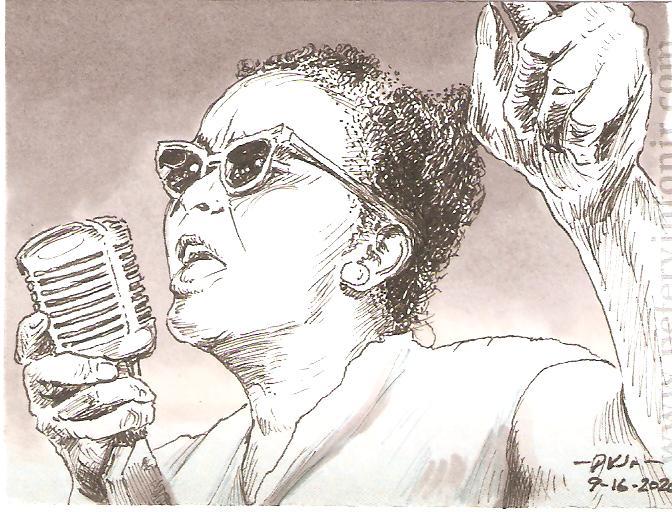
An ongoing illustrative history study
This piece originally posted 11/1/2020
(This was the last biography and accompanying artwork posted before the 2020 general election.)
Prelude | 49 | 50 | 51 | 52 | 53 | 54 | 55 | 56 | 57 | Email |
|---|
"There is also the danger in our culture that because a person is called upon to give public statements and is acclaimed by the establishment, such a person gets to the point of believing that he is the movement."
In this, the last biography in this sketchcard series before the 2020 general election, I thought it appropriate to study the life of Ella Baker, another oft-overlooked "behind-the-scenes" organizer whose efforts are only just now being re-discovered.
Born in 1903 Norfolk, Virginia, Baker experienced the effects of a race riot at the age of seven, which forced her family to move to North Carolina. She grew up listening to her grandmother's (Josephine Elizabeth "Bet" Ross)'s stories about slavery and developed an innate sense of social justice at an early age. She graduated (as valedictorian) from Shaw University --a school to which she would later return.
Baker then moved to New York and worked as a journalist for several newspapers and magazines specific to Black issues; from there she leveraged her experience into co-founding the Young Negroes Cooperative League (YNCL), and then, at the recommendation of George Schulyer, became a field secretary for the New York chapter of the NAACP. It was during this period that she began organizing and fundraising for the Montgomery Bus Boycott, coordinate the various sit-ins. In 1960 she returned to Shaw to organize and create what would become the Student Nonviolent Coordinating Committee (SNCC). Over the course of the SNCC's earliest years, Baker would mentor many of its most influential figures, to include Diane Nash (see previous entry in this series) and even Rosa Parks.
Famously Baker was at the center of the growing ideological split between the SNCC and its parent organization, the Southern Christian Leadership Conference (SCLC). Of the SCLC, Baker regarded its leadership as too personality-focused (not to mention blatantly sexist) and therefore too susceptible to rallying around a single power figure rather than around fixed principles. This philosophy of Participatory Democracy had guided Baker her whole life; as an avowed "behind-the-scenes" figure herself, for obvious reasons this led to disagreements with titans like Martin Luther King, Jr., though there were sympathies with some of King's advisors, most notably Bayard Rustin (see Lesson #5 in this series).
Baker's voter registration campaign of 1964 is regarded as an unsung-but-critical turning point: Horrified by stories such as Fannie Lou Hamer's (see Lesson #51 in this series), Baker organized the Mississippi Freedom Democratic Party (MFDP) as an alternative to Mississippi's Democrats, working to create a delegation that attended the 1964 National Democratic Party convention in Atlantic City, NJ. The group challenged the national party to affirm the voting rights of Blacks in the South. While the delegation was ultimately not seated, their lingering influence did eventually force a rule change to allow women and minorities to sit as delegates at the Democratic National Convention.
Additional homework: read and study https://actbuildchange.com/blog/why-do-we-know-so-little-about-ella-baker/
And on that note: If you haven't already mailed in your ballot, then PLEASE protect yourselves and stay safe when you go out to vote this week, my friends. It really IS that important.
Next page - Lesson 54: Sarah Parker Remond